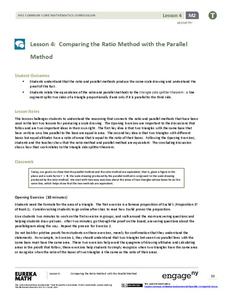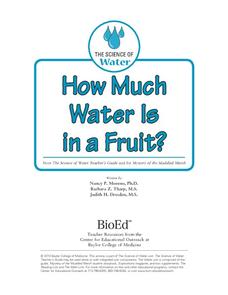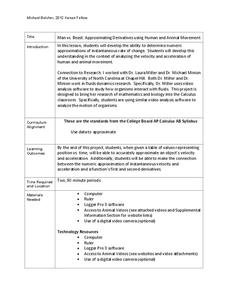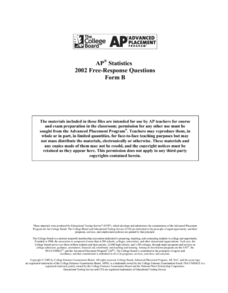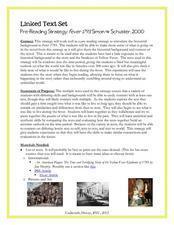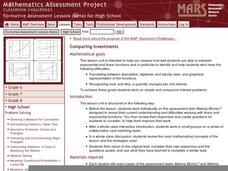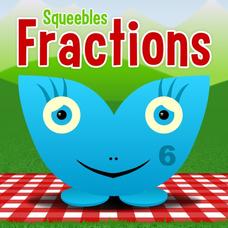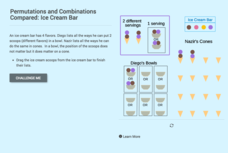National Endowment for the Humanities
Factory vs. Plantation in the North and South
North is to factory as South is to plantation—the perfect analogy for the economy that set up the Civil War! The first lesson in a series of five helps teach beginners why the economy creates a driving force for conflict. Analysis of...
EngageNY
Comparing the Ratio Method with the Parallel Method
Can you prove it? Lead your class through the development of the Side Splitter Theorem through proofs. Individuals connect the ratio and parallel method of dilation through an exploration of two proofs. After completing the proofs,...
World History Digital Education Foundation, Inc.
COVID-19: Comparison with the Influenza Pandemic of 1918
A timely lesson uses documentation from the Spanish influenza pandemic of 1918 to compare it to the COVID-19 pandemic in 2020. Scholars watch a short video, analyze sources, complete a worksheet, and write a claim with supporting...
EngageNY
Solution Sets to Simultaneous Equations (part 1)
How are systems related? Build on your pupils' previous knowledge of solving systems of equations by introducing systems of inequalities. Learners explore similarities between systems of equations and inequalities to make a strong...
Baylor College
How Much Water Is in a Fruit?
Compare the volume of an orange to the volume of liquid that can be extracted out of it. Also compare the mass of an apple before and after it has been dried out. In both of these activities, children find that there is an appreciable...
Scholastic
Study Jams! Order Whole Numbers
Mia's been practicing for the hundred yard dash and wants to know if she's improving. Help order her race times from greatest to least while learning how to compare numbers using place value. A variety of additional examples are included...
Curated OER
Shizuko’s Daughter: Problematic Situation
How could you decide which of your late mother's possessions are important enough to take to college with you? Decide which items would be the most valuable to you with an activity based on Kyoko Mori's Shizuko's Daughter. After...
BW Walch
Creating and Graphing Exponential Equations
Frequently found in biology and economic application problems, exponential equations show up as stars in this introductory presentation. Taking no background or knowledge of exponentials for granted, the slides walk learners...
National Sailing Hall of Fame
Sail Area Calculations
Do bigger sails mean that the sailboat goes faster? Middle and high schoolers compare sailboats, and learn that simply calculating sail area is not enough. A slideshow presentation demonstrates how to calculate the Sail...
media.yurisnight.net
Science Lesson Plan: Our Solar System: I Wonder?
Ever wonder why Pluto isn't considered a planet? Or how large the Earth is compared to the other inner planets? Explore the universe with a series of projects that simulate different aspects of our solar system. The activities require...
101 Questions
Coke Jacuzzi System of 3
Can you determine the exact volume of a bottle based on the relative volume of other bottles? A series of four videos shows someone pouring fluid into bottles. Scholars must set up a system of equations to determine how much each bottle...
Kenan Fellows
Man vs. Beast: Approximating Derivatives using Human and Animal Movement
What does dropping a ball look like as a graph? An engaging activity asks learners to record a video of dropping a ball and uploading the video to software for analysis. They compare the position of the ball to time and calculate the...
College Board
2002 AP® Statistics Free-Response Questions Form B
Develop a deeper understanding of statistics. The six released free-response items from the 2002 AP® Statistics Form B involve several concepts that are currently in the regular statistics standards. Teachers see how...
Acoustical Society of America
Tuning Fork Discovery
No need for a knife when a fork will do! Groups of pupils first read about the science of sound, and then experiment with tuning forks. Teams gather information about the pitch and length of their forks and compare them to...
Radford University
Box-and-Whisker Activity
Think inside the box. Working in small groups, pupils design a study to answer comparing two data sets. Team members collect data and construct box-and-whisker plots and analyze them to prove or disprove their hypothesis. They develop...
Curated OER
Linked Text Set: Pre-Reading Strategy. Fever 1793
The historical background for Fever 1793 is the focus of a pre-reading strategy that has class groups rotate through a series of stations stocked with photographs, articles, and other texts that describe the Yellow Fever outbreak of...
Brine Shrimp: Getting to Know a Salt Water Arthropod
Gather small observations of arthropods. Using brine shrimp, pupils observe the life cycle of arthropods. Learners set up saltwater aquariums and observe the brine shrimp over a three-week period. To finish, they compare and contrast how...
Curated OER
Comparing Investments
Money, money, money. A complete lesson that makes use of different representations of simple and compound interest, including written scenarios, tables, graphs, and equations to highlight similarities and differences between linear and...
Key Stage Fun
Squeebles Fractions
We are not exactly sure what a Squeeble is, but apparently they love cake and fractions, and your little bakers-turned-mathematicians will also. This app focuses on the basics of fractions including modeling fractions, equivalent...
Blogger
Integer Operations Posters
Eliminate young mathematicians' confusion over performing operations with integers using this set of classroom displays. Providing learners with simple, easy-to-follow rules, this resource will have students fluently adding,...
Kinder Corner
Counting Cards
Reinforce counting skills with a set of cards that showcase numbers 1–10. Two types of cards are provided—a number card and a card that represents the number with objects.
CK-12 Foundation
Comparing Equation of Parallel and Perpendicular Lines: Parallel and Perpendicular Lines
It seems perpendicular lines have slopes which follow a specific rule. Scholars use an interactive to investigate this rule by moving a pair of lines on a coordinate plane. They find that perpendicular lines have slopes that are opposite...
CK-12 Foundation
Permutations and Combinations Compared: Colored Candies
Here's a sweet resource on sample spaces. An enticing interactive allows users to list all possibilities for the flavors of candy given to a friend. Scholars must also determine whether permutations or combinations are more...
CK-12 Foundation
Permutations and Combinations Compared: Ice Cream Bar
Learning math from an ice cream shop—what a tasty treat! Individuals use an interactive to list all possibilities for a double-scoop ice cream. Along the way, they learn to distinguish between permutations and computations.
Other popular searches
- Comparing Sets of Objects
- Comparing Sets of Coins
- Venn Diagrams Comparing Sets
- Comparing Sets of Money
- Comparing Sets of Data
- Nouns and Comparing Sets
- Comparing Two Sets of Data



